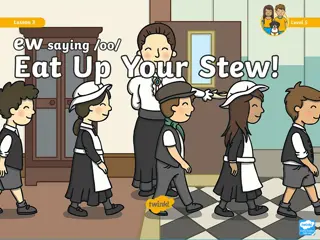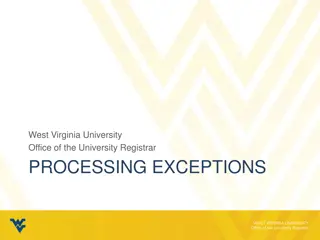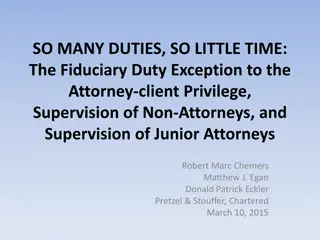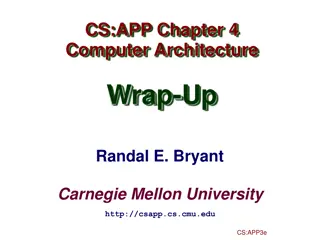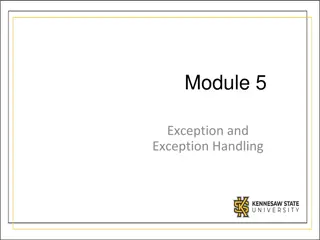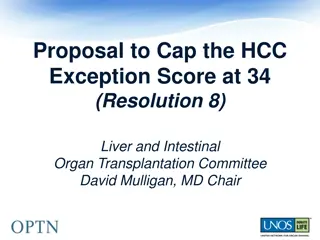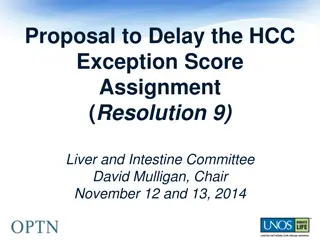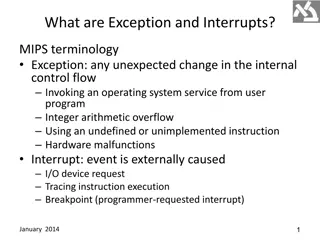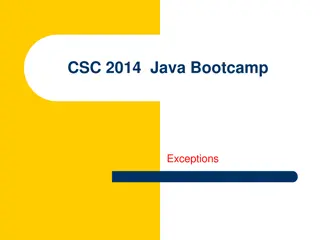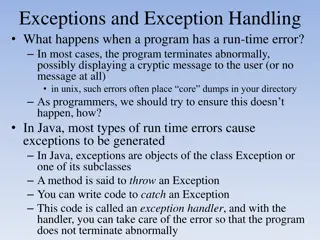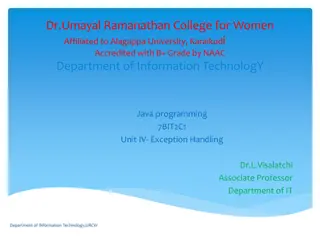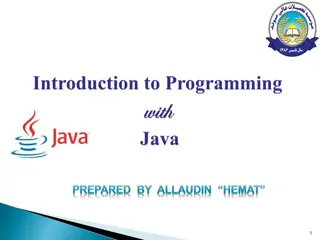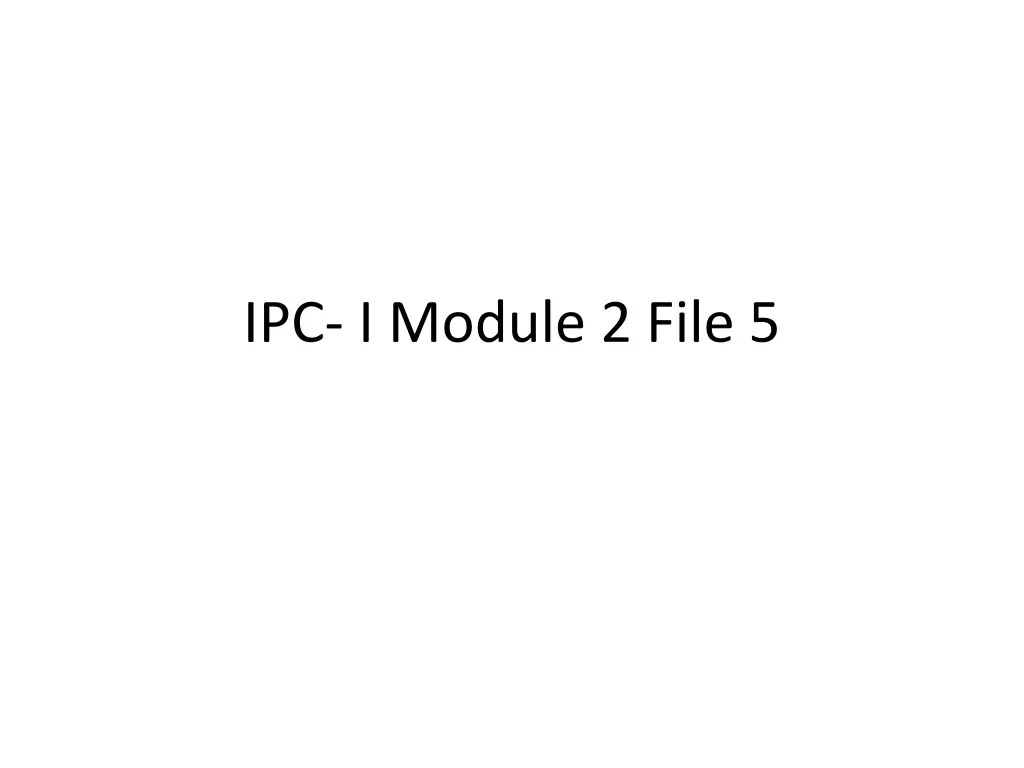
Exceptions in Good Faith under IPC
Learn about the legal concept of acting in good faith for the benefit of others under the Indian Penal Code. Discover scenarios where harm may be caused, but not intended, when consent is given for the person's benefit. Find out about exceptions for minors and individuals of unsound mind, and the importance of consent given without fear or misconception.
Download Presentation

Please find below an Image/Link to download the presentation.
The content on the website is provided AS IS for your information and personal use only. It may not be sold, licensed, or shared on other websites without obtaining consent from the author. If you encounter any issues during the download, it is possible that the publisher has removed the file from their server.
You are allowed to download the files provided on this website for personal or commercial use, subject to the condition that they are used lawfully. All files are the property of their respective owners.
The content on the website is provided AS IS for your information and personal use only. It may not be sold, licensed, or shared on other websites without obtaining consent from the author.
E N D
Presentation Transcript
General Exceptions- Good Faith Sec-88. consent in good faith for person s benefit.- Nothing which is not intended to cause death , is an offence by reason of any harm which it may cause, or be intended by the doer to cause, or be known by the sore to be likely to cause, to any person for whose benefit it is done in good faith, and who has given a consent, whether express or implied, to suffer that harm, or to take the risk or that harm. Illustration A, a surgeon, knowing that a particular operation is likely to cause the death of Z, who suffers under a painful complaint, but not intending to cause Z s death and intending in good faith, Z s benefit performs that operation on Z, with Z s consent. A has committed no offence. Act not intended to cause death, done by
General Exceptions- Good Faith 89. Nothing which is done in good faith for the benefit of a person under twelve years of age, or of unsound mind, by or by consent, either express or implied, of the guardian or other person having lawful charge of that person, is an offence by reason of any harm which it may cause, or be intended by the doer to cause or be known by the doer to be likely to cause to that person: Provisos Provided- First-That this exception shall not extend to the intentional causing of death, or to the attempting to cause death; Secondly-That this exception shall not extend to the doing of any thing which the person doing it knows to be likely to cause death, for any purpose other than the preventing of death or grievous hurt, or the curing of any grievous disease or infirmity; Thirdly-That this exception shall not extend to the voluntary causing of hurt, or to the attempting to cases hurt, unless it be for the purpose of preventing death or grievous hurt, or the curing of any grievous disease or infirmity; Fourthly-That this exception shall not extend to the abetment of any offence, to the committing of which offence it would not extend. Illustrations A , in good faith, for his child s benefit without his child s consent, has his child cut for the stone by a surgeon, knowing it to be likely that the operation will cause the child s death, but not intending to cause the child s death , but not intending to cause the child s death. A is within the exception in as much as his object was the cure of the child. Act done in good faith for benefit faith for benefit of child or by consent or guardian.-
General Exceptions- Consent 90. Consent known to be given under fear or misconception.- A consent is not such a consent as it intended by any section of this Code, if the consent is given by a person under fear of injury, or under a misconception of fact, and if the person doing the act knows, or has reason to believe, that the consent was given in consequence of such fear or misconception; or Consent of insane person.- if the consent is given by a person who, from unsoundness of mind, or intoxication, is unable to understand the nature and consequence of that to which he gives his consent; or Consent of child.- unless the contrary appears from the context, if the consent is given by a person who is under twelve years of age.
General Exceptions- Consent 91. Exclusion of acts which are offences independently of harm caused.- The exceptions in sections 87,88 and 89 do not extend to acts which are offences independently of any harm which they may cause, or be known to be likely to cause, to the persons giving the consent , or on whose behalf the consent is given. Illustration Causing miscarriage (unless caused in good faith for the purpose of saving the life of the woman) is an offence independently of any harm which it may cause or be intended to cause to the woman. Therefore, it is not an offence by reason of such harm ; and the consent of the women
General Exceptions- Good Faith Sec-92. person for whose benefit it is done in good faith, even without that person s consent , if the circumstances are such that it is impossible for that person to signify consent, or if that person is incapable of giving consent, and has no guardian or other person in lawful charge of him from whom it possible to obtain consent in time for the thing to be done with benefit: Provisos- Provided- First-That this exception shall not extend shall not extend to the intentional causing of death, or the attempting to cause death; Secondly-That this exception shall not extend to the doing of any thing which the person doing it knows to be likely to cause death, for any purpose other than the preventing of death or grievous hurt, or the curing of any grievous disease or infirmity; Thirdly-That this exception shall not extend to the voluntary causing of hurt, or to the attempting to cause hurt, for any purpose other than the preventing of death or hurt; Fourthly-That this exception shall not extend to the abetment of any offence, to the committing of which offence it which offence to would not extend. Illustrations (a) Z is thrown from his horse, and is insensible. A, a surgeon, find that Z requires to be trepanned. A, not intending Z s death, but in good faith, for Z s benefit, performs the trepan before Z recovers his power of judging for himself. A has committed no offence. (b) Z is carried off by a tiger. A fires at the tiger knowing it to be likely that the shot may kill Z, but not intending to kill Z, and in good faith intending Z s benefit. A s ball gives Z a mortal wound. A has committed on offence. (c) A, a surgeon , see a child suffer an accident which is likely to prove fatal unless an operation be immediately performed. There is no time to apply to the child s guardian. A performs the operation in spite of the entreaties of the child s benefit. A has committed no offence. (d) A is a house which is on fire, with Z, a child. People below hold out a blanket. A drops the child from the housetop , knowing it to be likely that the fall may kill the child, but not intending to kill the child, and intending , in good faith, the child s benefit. Here, even if the child is killed by the fall, A has committed no offence. Explanation.-Mere pecuniary benefit is not benefit within the meaning of sections 88, 89 and 92. Sec-.93 Communication made in good faith.- No communication made in good faith is an offence by reason of any harm to the person to whom it is made, if it is made for the benefit of that person Act done in good faith for benefit of a person without consent.-Nothing is an offence by reason of any harm which it may cause to a
General Exceptions 94. offences against the State punishable with death, nothing is an offence which is done by a person who is compelled to do it by threats, which at the time of doing it, reasonably cause the apprehension that instant death to that person will otherwise be the consequence: Provided the person doing the act did not of his own accord, or from a reasonable apprehension of harm to himself short of instant death, place himself in the situation by which he became subject to such constraint. Explanation 1.- A person who , of his own accord, or by reason of a threat of being beaten, joins a gang of dacoits, knowing their character, is not entitled to the benefit of this exception ,on the ground of his having been compelled by his associates to do anything that is an offence by law. Explanation 2.- A person seized by a gang of dacoits, and forced, by threat of instant death, to do a thing which is an offence by law; for example, a smith compelled to take his tools and to force the door of a house for the dacoits to enter and plunder it, is entitled to the benefit of this exception . Act to which a person is compelled by threats.- Except murder, and

